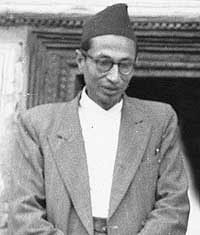 Photographs of Kathmandu in the 1930s show a mass of brick-and-mortar hovels punctuated by opulent Rana palaces with aspirations to Versailles. Ordinary Nepalis who appear in these photographs look pre-political to us now, resigned to their poverty (or we attribute to them inscrutable fatalistic minds). Yet they were by no means living in simple times. When Juddha Sumshere Jang Bahadur Rana became maharaja in 1932, anti-Rana sentiment was gaining ground in Kathmandu. Shukra Raj Joshi had met Gandhi and Subhas Chandra Bose in India, and had formed the Nepali Nagarik Adhikar Samiti, a group demanding citizens' rights. Another group, Ajambari Mat, had been founded by Newar intellectuals opposing the Bahun caste's supremacy, and demanding social justice. Teachers at the Mahavir School in Khilha Tole were preparing an independent syllabus aimed at sparking political consciousness in students, and the school was becoming a gathering place of budding revolutionaries. A smattering of free thinkers were organising underground libraries and discussion centres. All this was before political parties began to form in the 1940s.
Photographs of Kathmandu in the 1930s show a mass of brick-and-mortar hovels punctuated by opulent Rana palaces with aspirations to Versailles. Ordinary Nepalis who appear in these photographs look pre-political to us now, resigned to their poverty (or we attribute to them inscrutable fatalistic minds). Yet they were by no means living in simple times. When Juddha Sumshere Jang Bahadur Rana became maharaja in 1932, anti-Rana sentiment was gaining ground in Kathmandu. Shukra Raj Joshi had met Gandhi and Subhas Chandra Bose in India, and had formed the Nepali Nagarik Adhikar Samiti, a group demanding citizens' rights. Another group, Ajambari Mat, had been founded by Newar intellectuals opposing the Bahun caste's supremacy, and demanding social justice. Teachers at the Mahavir School in Khilha Tole were preparing an independent syllabus aimed at sparking political consciousness in students, and the school was becoming a gathering place of budding revolutionaries. A smattering of free thinkers were organising underground libraries and discussion centres. All this was before political parties began to form in the 1940s. 
Some of Nepal's leading poets and writers of the 1930s and 1940s were among those directly leading anti-Rana dissent. Kedar Man Vyathit was active in the Nepali Nagarik Adhikar Samiti, and Siddhicharan Shrestha was teaching at the Mahavir School. Before them, poets Shambhu Prasad Dhungel, Lekh Nath Poudyal and Juddha Prasad Mishra had written lyrically on political oppression and the suffering of political prisoners. Vyathit and Shrestha were contemporaries of Laxmi Prasad Devkota and Gopal Prasad Rimal, both of whom also strongly protested injustice in their art and life. By then it was the norm for important poets to write not just about their subjective experiences, but of the suffering of ordinary Nepalis.
Though in Panchayat years Siddhicharan Shrestha came to be known primarily as a romantic poet, his early work focuses equally on the need for social change and revolution. In the poem below, he mourns the death of a son of Laxmi Prasad Devkota, who, despite gaining wide popularity in his short lifetime, lived in unspeakable poverty. Shrestha urges his friend to transform his private suffering into a revolt, into the seeds of revolution.
To Poet Devkota
 Wounded bird, what can I say your bruises are gathering still
Wounded bird, what can I say your bruises are gathering still
The world wants to snatch from you even your soul
This is the way perhaps of the foundation's desire to hear
the song that you sing kneading your chest, drawing your blood
Speak poet, sing, parching your vitality: What have you received here?
Have you seen anyone so much as melt in this arid land?
Friend, this land won't be bettered by spreading hands, crying, screaming
What will you gain by gathering affectations of sympathy?
He who took your son by sending death at a tender age
by whose inspired anomaly you suffer such penury
take revenge on him, poet, sing, sing a fire song
Hundreds of thousands who have lost their sons will befriend you
Poet, sound a song to raise the corpses of our uncounted sons
a song to shatter the unconsciousness of each age
Poet, the dinghy of life navigates a vast sea of suffering
Stop, don't spend tears at the passing of a young beloved son
On the pain on the ground, poet, lay down your unbearable distress
So many lives are going to waste daily for want of food and clothes
Add your drop of water to this sea of pain
Navigate your life's dinghy on these waters
Dance rubbing the ashes of burned dreams and putrescent hopes
Poet, live even in suffering to prepare the earth for hundreds of thousands
Build a new world free of the present anomaly
Live and save others, defeat death and spread robustness here
Help children all over the world to stop dying before their time
Spread your command, go, poet, let cries and tears stop at once
Country arranger, poet, you have sons all over the country
Go, stand up, or others may die, ah, how they live.
The poem echoes Shrestha's earlier call to himself to 'become a poet inside and outside a warrior.' In this, he stands as an example for Nepali poets today, many of who share his acute desire to invite (or force) progress to Nepal.
Note: The original poem is written in a strict metre and rhyme scheme, which (fearing laughable results) I have not attempted to mimic in the English translation.


